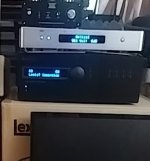Do you still feel the high-end audio industry has lost its way in the manner you described 15 years ago?
Not in the same manner; there's no hope now. Audio actually used to have a goal: perfect reproduction of the sound of real music performed in a real space. That was found difficult to achieve, and it was abandoned when most music lovers, who almost never heard anything except amplified music anyway, forgot what "the real thing" had sounded like. Today, "good" sound is whatever one likes. As Art Dudley so succinctly said [in his January 2004 "Listening," see "Letters," p.9], fidelity is irrelevant to music.
Since the only measure of sound quality is that the listener likes it, that has pretty well put an end to audio advancement, because different people rarely agree about sound quality. Abandoning the acoustical-instrument standard, and the mindless acceptance of voodoo science, were not parts of my original vision.
I remember you strongly feeling back in 1992 that multichannel/surround reproduction was the only chance the industry had for getting back on course.
With fidelity in stagnation, spatiality was the only area of improvement left.
As you were so committed to surround, do you feel that the commercial failures of DVD-Audio and SACD could have been avoided?
I doubt it. No audio product has ever succeeded because it was better, only because it was cheaper, smaller, or easier to use. Your generation of music lovers will probably be the last that even think about fidelity.
Judging by online forums and by the e-mail I receive, there are currently three areas of passion for audiophiles: vinyl playback, headphone listening, and music servers. Are you surprised by this?
I find them all boring, but nothing surprises me any more.
Do you see any signs of future vitality in high-end audio?
Vitality? Don't make me laugh. Audio as a hobby is dying, largely by its own hand. As far as the real world is concerned, high-end audio lost its credibility during the 1980s, when it flatly refused to submit to the kind of basic honesty controls (double-blind testing, for example) that had legitimized every other serious scientific endeavor since Pascal. [This refusal] is a source of endless derisive amusement among rational people and of perpetual embarrassment for me, because I am associated by so many people with the mess my disciples made of spreading my gospel. For the record: I never, ever claimed that measurements don't matter. What I said (and very often, at that) was, they don't always tell the whole story. Not quite the same thing.
Remember those loudspeaker shoot-outs we used to have during our annual writer gatherings in Santa Fe? The frequent occasions when various reviewers would repeatedly choose the same loudspeaker as their favorite (or least-favorite) model? That was all the proof needed that [blind] testing does work, aside from the fact that it's (still) the only honest kind. It also suggested that simple ear training, with DBT confirmation, could have built the kind of listening confidence among talented reviewers that might have made a world of difference in the outcome of high-end audio.
Yet you achieved so much, Gordon.
I know I did, and my whole excuse for it—a love for the sound of live classical music—lost its relevance in the US within 10 years. I was done in by time, history, and the most spoiled, destructive generation of irresponsible brats the world has ever seen. (I refer, of course, to the Boomers.)

